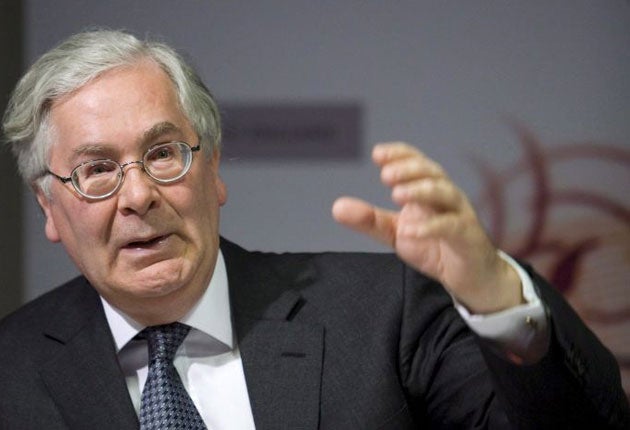John Kampfner: The economic crisis poses a threat to European democracy

Politicians and central bankers have long since ditched the stricture – don't spook the markets. From Sir Mervyn King to Angela Merkel, from Mario Draghi to George Osborne, they now compete for the most vivid Armageddon rhetoric.
Voters do not know how to react. Should they spend? Or should they do as the Germans do and save? Should they eat, drink and be merry, or should they hibernate for six years? Nobody knows the answer, and individuals will act according to their mood and their circumstance.
With language being devalued as quickly as economies go under, one quote this weekend struck me as particularly chilling. It came from Australia's Prime Minister, Julia Gillard, as she sought to justify her government's intention to sell uranium to India. The ruling Labor Party had for years stuck to a ban on sales to a nation that refuses to sign the nuclear non-proliferation treaty.
Gillard simply explained: "At this conference we should take a decision in the national interest, a decision about strengthening our strategic partnership with India in this the Asian century."
Why should a country that owns an estimated 40 per cent of the world's uranium be concerned with anything other than national economic and strategic interest? Commodity-rich states, such as Australia, have weathered the financial storms with comparative ease. China, India and other emerging Asian economies are their main markets. There is no merit in antagonising them. Realpolitik never really disappeared. But, in these straitened times, it is back with a vengeance.
With its handy $3trn in foreign exchange reserves, China holds many of the cards and is playing them with increasing astuteness. For sure, the Chinese economy is set to perform a little worse next year, but the OECD forecast of growth slowing to 8.5 per cent in 2012 (from 9.3 per cent this year), and rising to 9.5 per cent in 2013 puts it on a different planet to the Europeans or Americans.
For some time now, Western governments have fought shy of challenging China on human rights. Visiting leaders might go through the motions, but it is part of the agreed choreography that the subject is mentioned for the benefit of a few pesky voters back home, and everyone quickly moves on to discuss trade – and, increasingly now, bailouts.
The genuflection towards Chinese-style "managed democracy" and "authoritarian capitalism" goes beyond politics. As the euro crisis unfolded, and as Barack Obama continued to grapple with America's joblessness, a number of economists and commentators enviously eye the economic models of the Bric countries.
After decades of being lectured to by Western governments and international financial institutions, the emerging economic powers are enjoying the moment. During a meeting with the IMF's managing director, Christine Lagarde, Brazil's Finance Minister, Guido Mantega, couldn't resist making a dig at her expense: "This time, the IMF did not come here bringing money as in the past," Mantega told reporters. "This time it came to ask Brazil to lend it money, and I prefer to be a creditor than a debtor."
Lagarde returned the compliment, praising the "marked resilience" of the Brazilian economy, which she said was based around inflation targeting and flexible exchange rates – and, most of all, fiscal responsibility, unlike the spendthrift southern Europeans. She pointed out that in the interconnected global economy, no country was protected from Europe's squalls. Everyone is vulnerable, but some are more vulnerable than others.
At the root of the Brics' perceived success is the combination of low taxation, flexible labour, a lack of welfare provision and limited or no democratic accountability. If only we could be like them, even just for a week, without having to worry about hidebound voters, we could sort out the mess: so some Western politicians lament, only half in jest.
In Greece and Italy they already have government by technocracy. The next phase of German-led fiscal integration by the euro 17 will include the requirement to submit future national budgets to Brussels for approval.
The post-1945 European settlement, with strong and universal welfare provision, is now up for grabs. Specific entitlements may have varied from country to country; they have been challenged from time to time, such as under the Thatcher government.
But, in general terms, they have been a source of political, social and economic stability. As the balance of power shifts eastwards, these assumptions no longer hold sway. Flat taxation is one of the new mantras.
Russia was one of the first exponents, with a minuscule 13 per cent marginal rate set in 2001. Many economists now talk of reducing headline tax rates, insisting that this is the best way of kick-starting the economy (alongside grand infrastructure projects – another Chinese speciality).
For the moment, politicians in the old continent are right to focus on the here and now. On the main stage, Merkel and Sarkozy will today try to agree a deal to put to other EU leaders on Friday. Failure will be clear for all to see; success harder to determine.
Across the Channel, in his forlorn cameo role, Cameron will talk up the life sciences, as part of his exhortation for the UK to use entrepreneurialism to dig its way out of the mire.
Over in the US, expect little of substance as Barack Obama focuses on staving off the challenge from the eccentric assortment of Republican challengers.
Which brings us back to China: increasingly we will look to Beijing to help sort out our mess. Eventually, it too will play its part, as the long-term decline of consumption in the US and EU will not be in its interests. That will be just the start. Watch how the two economic and social models, very gradually, coalesce. Gillard's Asian century is already upon us.
Join our commenting forum
Join thought-provoking conversations, follow other Independent readers and see their replies
Comments
Bookmark popover
Removed from bookmarks